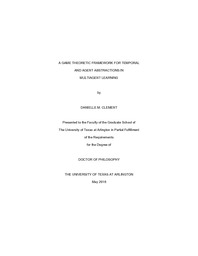| dc.contributor.advisor | Huber, Manfred | |
| dc.creator | Clement, Danielle | |
| dc.date.accessioned | 2016-09-28T18:00:03Z | |
| dc.date.available | 2016-09-28T18:00:03Z | |
| dc.date.created | 2016-05 | |
| dc.date.issued | 2016-05-10 | |
| dc.date.submitted | May 2016 | |
| dc.identifier.uri | http://hdl.handle.net/10106/25896 | |
| dc.description.abstract | A major challenge in the area of multiagent reinforcement learning is addressing the issue of scale as systems get more and more complex. Systems with multiple agents attempting to explore and learn about the world they inhabit concurrently require more time and resources to learn optimal responses. Increasing the number of agents within a system dramatically increases the cost to represent the problem and calculate the solution.
Single agent systems address part of the scaling problem through the use of temporal abstractions, or mechanisms to consider a sequence of many actions as a single temporal “step”. This concept has been applied in multiagent systems as well, but the work is predominantly focused on scenarios where all of the agents work together towards a common goal. The research presented in this dissertation focuses on situations where agents work to achieve independent goals, but need to collaborate with other agents in the world periodically in order to achieve those goals. To address the issue of scale, this dissertation presents an approach to represent sets of agents as a single entity whose interactions in the world are also temporally abstracted. Through implementation of this framework, agents are able to make game-theoretic decisions via stage games of significantly reduced dimensionality.
The first focus of this dissertation is on defining the mechanism that agents within an agent set (or coalition) use to interact amongst themselves. A key contribution of this research is the application of temporally extended actions, called options, to a multiagent environment. These multiagent options serve as the core behaviors of sets of agents. Those behaviors are assessed in terms of standard multiagent learning techniques. Also presented are varied approaches to form and dissolve coalitions in a semi-cooperative environment.
After establishing the key properties required to participate in a coalition of agents, this dissertation focuses on the interactions between coalitions of agents. Another key contribution of this research is the structure developed to game-theoretically select coalitions in which to participate, as well as to represent the rest of the world as abstracted sets of agents. This structure is defined and its performance is evaluated in a grid-world setting with decisions made by a centralized agent. Solutions are assessed for correspondence of the selected decisions as compared to those that would be made if all agents were represented independently.
Finally, this structure is refined and evaluated to support decision-making by independent agents in a distributed fashion. Performance of these algorithms is also assessed.
To date, the vast majority of research in this area has been cooperative in nature, hierarchically structured and/or focused on maximizing group performance. Focus on interactions between sets of agents is rare. This research is unique in the current field of multiagent reinforcement learning in its ability for independently motivated agents to reason about other agents in the environment as abstracted sets of agents within semi-cooperative environments. | |
| dc.format.mimetype | application/pdf | |
| dc.language.iso | en_US | |
| dc.subject | Multiagent reinforcement learning | |
| dc.subject | Game theory | |
| dc.title | A Game Theoretic Framework for Temporal and Agent Abstractions in Multiagent Learning | |
| dc.type | Thesis | |
| dc.degree.department | Computer Science and Engineering | |
| dc.degree.name | Doctor of Philosophy in Computer Science | |
| dc.date.updated | 2016-09-28T18:00:35Z | |
| thesis.degree.department | Computer Science and Engineering | |
| thesis.degree.grantor | The University of Texas at Arlington | |
| thesis.degree.level | Doctoral | |
| thesis.degree.name | Doctor of Philosophy in Computer Science | |
| dc.type.material | text | |
| dc.creator.orcid | 0000-0001-9711-0027 | |

